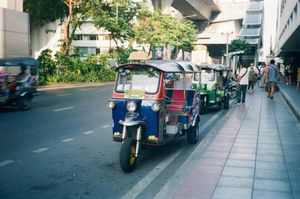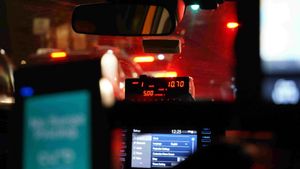11 Common Scams in Bangkok and How to Avoid Them
If it’s your first time in Bangkok, it’s essential to be aware of the tourist scams that frequently target travelers. By informing yourself ahead of time, you can avoid becoming a vulnerable tourist in Thailand and stay clear of common Bangkok scams before they happen. In this article, we’ll explore 11 tourist scams in Bangkok and tell you how to avoid them.
The Most Common Bangkok Scams and How to Outsmart Them
Bangkok frequently ranks as one of the safest cities in Southeast Asia, but as with all big cities, scams are commonplace. Whether it’s English-speaking locals pulling tricks at an ATM or opportunists trying to fleece unsuspecting visitors to the city’s tourist spots, Bangkok scams affect tourists on a regular basis.
In this article, we’ll explore 11 of the most common Bangkok scams for tourists to watch out for.
1. The Grand Palace/Wat Pho is "Closed" Scam
One of the most popular places to see in Bangkok is the Grand Palace. It’s often the first place that tourists visit, and that popularity attracts scammers. Here’s how the Grand Palace scam works:
- Friendly strangers approach tourists with false information.
- The scammers state that the palace is closed due to an event or special holiday.
- The scammer offers to take the tourists to an alternative location, such as a temple.
The goal of this Bangkok tourist trap is to lure tourists to a store or stall where they’ll be pressured to purchase items that are usually illegal/fake, and overpriced, with the scammer then getting a kickback from the owner.
How to avoid the Grand Palace scam:
- Ignore locals who claim the palace is closed.
- Only trust official signs.
- Check official opening/closing times and other info on official websites and social media.
Quick facts about The Grand Palace:
- Opening Hours: 08:30-15:30 Daily
- Price: THB 500
- Dwell Time: 2-4 Hours
- When to Visit: Arrive at 08:30 to avoid the crowds and heat, or shortly before closing time.
- Best Way to Get There: A bus will take you directly to the Grand Palace, while the express boat offers a popular and scenic route.
- Tip: The Grand Palace is a sacred location for the Thai people. Dress modestly and appropriately.
2. The Tuk Tuk Price Gouge and Gem Scam
Tuk tuk drivers are notorious for giving rides to tourists for just a few baht, and while it’s often a great way to get around, they can also be the source of some of the worst scams in BKK.
How the tuk tuk scam or Bangkok gem scam works:
- Tuk tuk drivers avoid reading the meter at the end of the ride.
- They lead tourists on a detour, resulting in a much higher rate.
- Tuk tuk drivers often take tourists to gem stores, which house a variety of overpriced and sometimes artificial gems.
Here’s how to avoid Bangkok tuk tuk scams:
- Decline suspiciously cheap rides.
- Learn the standard rates.
- Choose a ride-sharing service instead (such as Bolt or Grab) or rent a car or scooter.
- Confirm a price before accepting the ride.
3. The "Friendly Local" Who Guides You Astray
If you’re approached by friendly strangers at popular tourist attractions, they may have an agenda. Be vigilant when you encounter overly enthusiastic and friendly strangers who appear eager to brighten your day.
How this Bangkok scam works:
- Friendly strangers redirect you to a particular gem store or tuk tuk driver.
- These scammers often receive commission for supplying gem stores with visiting tourists.
- A common way to solicit your attention is to claim that the attraction you’re visiting (such as a temple) is closed.
- To avoid the scam, don’t engage with overly friendly strangers.
4. The Bar/Nightclub Bill Shock
It’s best to decline offers for free drinks, special events, or VIP rooms when painting the town of Bangkok red. Many unsuspecting tourists fall victim to this common Bangkok scam.
How this Bangkok scam works:
- You receive offers for free drinks or free entry.
- You’re pressured to purchase drinks.
- You’re presented with hidden charges.
- You have a sense that something isn’t right.
How to avoid this Bangkok scam:
- Pay with cash.
- Never flaunt your wealth.
- Always check the prices of drinks and entry fees.
- Be alert for hidden costs.
5. The Tailor Shop Deception
Cheap custom garments? Sounds like a good deal, but it could also be the Bangkok suit scam. It might seem genuine at first, but that’s how they lure you in.
Here’s how to avoid the suit scam in Bangkok:
- Locals approach tourists promising to deliver custom-made garments of the finest quality.
- The tourist is pressured to pay up front.
- When the finished garment arrives, it’s often ill-fitting and made with low-quality fabric or artificial textiles.
- You can avoid the tailor scam by refusing to pay for garments before you receive them.
6. The Bird Seed/Photo Scam
A common Bangkok scam that affects tourists is the bird seed/photo scam.
How this Bangkok scam works:
- Scammers lurk around popular tourist areas offering “free” bags of bird seed.
- The catch? Once the tourists have used the bird seed, the scammer insists on being reimbursed with a hefty payment.
How to avoid this Bangkok scam:
- Always question friendly strangers and free offers.
- Decline invitations to accept free bird seed.
7. The Puppy/Kitten Rescuer Scam
Unfortunately, scammers in Bangkok have resorted to using animals to scam tourists:
- Friendly strangers claim to represent an animal rescue organization.
- Scammers play upon the emotions of tourists by soliciting their trust and cash in support of animals in need.
- Often, scammers only present photos of animals.
- Scammers request funds for vet care or adoption.
How to avoid this Bangkok scam:
- Be alert if friendly strangers approach you with overly emotional stories.
- Only trust established organizations and shelters.
8. The Taxi Meter Refusal
Taxi drivers are notorious for targeting tourists in Bangkok. The taxi scam is when taxi drivers refuse to read the meter and insist on over-charging tourists. While taxis are a popular form of Bangkok airport transfer, they are fortunately not the only ones.
How to avoid the taxi scam:
- Opt for public transportation.
- Use ride-sharing apps such as Grab and Bolt.
9. “Can I see your country’s money?” scam
Never reveal or show cash to locals in Bangkok, as there is usually a hidden agenda. Be on alert for friendly strangers who request to see your foreign money.
How this Bangkok scam works:
- Scammers examine your foreign cash and simultaneously create a distraction.
- While they divert your attention, they steal your money.
- This common Bangkok scam can result in you losing some or all of your funds.
How to avoid this Bangkok scam:
- Protect your money by keeping it in a safe place.
- Never trust strangers with friendly offers or requests.
10. The Ladyboy Pickpocket
Ladyboys regularly scam travelers in busy tourist areas of Bangkok, such as hotels, bars, or on the streets:
- Ladyboys work in unison to create distractions.
- One ladyboy captures the attention of a tourist by initiating a friendly conversation.
- Once they’ve gained your attention, another ladyboy sneaks around and starts pickpocketing.
- Always be mindful and practice caution when visiting bars or nightclubs.
- Avoid this common Bangkok scam by remaining cautious when approached by ladyboys.
11. The Ping-Pong Show Scam
In Bangkok, a ping-pong show is a form of adult entertainment that is frequently used to scam tourists at nightclubs. If you frequent nightclubs or find yourself in the red light district, be on alert if a local invites you to a “ping-pong show”.
How this Bangkok scam works:
- The offer usually includes the promise of free drinks.
- At the end of the show, tourists receive a massive bill revealing overpriced drinks and unexpected charges.
- You’ll likely find yourself paying for features such as the performance itself or overly generous tips.
- To avoid this Bangkok scam, we suggest scanning your environment and remaining vigilant when you visit nightclubs or bars.
General Tips for Staying Safe in Bangkok
Whether you’re being targeted at shopping malls or street food markets, there are reliable ways to avoid scams in Bangkok.
Trust Your Gut
Your gut is your best ally when it comes to making your way through foreign environments. This is particularly true when visiting a country such as Thailand and navigating Bangkok scams. So, avoid tourist traps and don’t accept offers that seem too good to be true—if your gut is telling you that something is suspicious, listen to it.
Be Aware of Your Surroundings
Always scan your environment and be aware of what goes on around you. It’s good to keep in mind that if you’re not a local, you’re often a target. Be on the lookout for suspicious activity, random offers, or lurking strangers.
Know Your Destination
We recommend planning and doing research before visiting the bustling city of Bangkok. While some locations are good for drifting and exploring, it’s good to know your destination when heading to Thailand’s capital city. Since Thailand offers a unique culture, you’ll want to dress appropriately when visiting certain areas. As discussed in this article, Bangkok is a busy city where you’ll need to stay alert to common scams.
Always Negotiate Fares
Since travelers are targets, always negotiate fares and agree on terms up front. To make life easier, we recommend booking airport transfers to your hotel on 12Go. Rest assured that you’ll be in good hands with one of the most trusted online e-ticketing platforms. 12Go enables you to compare prices and book all modes of transport in Bangkok, from buses to ferries and airport transfers.
Keep Valuables Secure
Buy a safe travel bag to keep your cash and valuables secure. Always be aware of your surroundings and keep your valuables safe when passing through tourist areas. Never allow strangers access to your personal possessions, and keep your valuables out of sight.
Avoid Overly Friendly Strangers
Unfortunately, when friendly locals approach you in Bangkok, there may be a hidden agenda. Scam artists frequently initiate a friendly conversation before luring you into a scam. A rule of thumb when visiting Bangkok is to decline all friendly offers and invitations, as they are usually scams.
Don’t Flash Cash or Valuables
Flashing your valuables can instantly turn you into a target. As a tourist, you’ll attract ample attention when passing Thai people. Always keep your valuables secure and don’t reveal your cash in public. Many Thai people will associate you with wealth, and it’s best to remain humble and modest. If you don’t wish to attract unnecessary attention, don’t flash your valuables.
Learn a Few Thai Phrases
Since Bangkok offers unique cultural traditions and considers many locations as sacred, you’ll want to be respectful. A great way to connect with locals and offer a gesture of respect is to learn a few Thai phrases before arriving. Having a few Thai phrases up your sleeve can make your journey easier, especially when visiting the many night markets and floating markets.
What To Do if You Fall Victim to a Scam
While it’s good to know how to avoid Bangkok scams, it’s equally important to know what to do in an unfortunate situation. Here are a few helpful tips if you fall victim to a Bangkok scam:
- Stay calm.
- Quickly take note of as many details as possible, such as the license plates of cars and motorbikes involved in the scam, as well as relevant locations and names.
- Take yourself to a safe location.
- Report the incident to police officers or a tourism authority if necessary.
- If your personal information or bank account is compromised, contact your bank for immediate assistance.
Enjoying Bangkok (Safely)
You’ll enjoy a safe and pleasant stay in Bangkok by keeping street smart and trusting your gut. Stay vigilant to avoid common Bangkok scams and opt for public transportation with less risk. Use cash where possible, but make sure it’s withdrawn from a genuine money exchange, and don’t carry large amounts with you.
Be prepared for the heat and humidity, show respect for local customs, and only consume quality meals. By preparing for your trip, you’ll have a stress-free and enriching journey!




